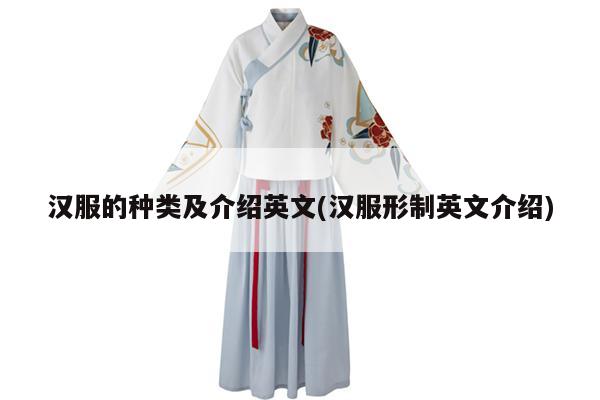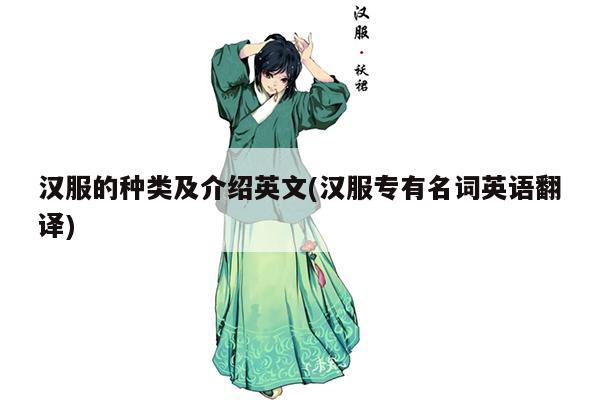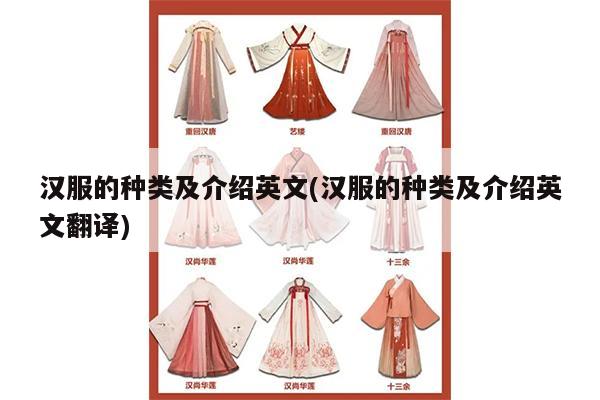汉服的种类及介绍英文(汉服形制英文介绍)
关於汉服的介绍 翻译成英文
The Xuan carry:The demitoilet of Zhou Dynasty establishment is a Xuan color, wide Xiu(very big sleeves), more tedious, is offer sacrifices to wait the important time just wears Zhao.
Song Ju:The top and bottom connects a body, around the body 1 turn or several, result in to tie up to round effect specially.Fight a country period is a daily clothing, the Han dynasty turns into into a demitoilet, didn't spread future generations.The some style lower hemses are more narrow and hour's ising long is mistaken for kimono.
Deep dress:Fight the country period daily clothing, was what men and women all can wear Zhao at that time.The top and bottom connects a body(the different Wu spread at that time of the blouse descends clothes), clothes part use cloth 12, the elephant Zheng was 12 months for a year.Didn't spread down at that time, at Ming Dynasty is again test according to come out, become the man's demitoilet.
Keep Ju:Top and bottom the daily clothing of the man who cut, fasten belt or waist to seal.
Lan Shan:The circle get, round a cloth in the lower part and have another Be an officer to take.
Keep a body:Call a tunic again, the Ming Dynasty is period of man daily clothing.BE also that the top and bottom cut, is dark to put, result in effect of beat the plait.
Ru skirt:The daily clothing of woman, the Ru is a short dress and the skirt is a skirt.
Half arm:1 kind of woman blouse, the short sleeve of the sleeves similar modern.
Together chest Ru skirt:The clothing style of tang dynasty, similar to the general Ru skirt, but fasten in the chest above.Match the Yan can(read ke 1) son(a kind of underwear) with to the Jin blouse.Take of draw lessons from object.
To the Jin blouse:The woman blouse of tang dynasty period, different Wu usually the Han take of hand over to get, but to the Jin style, after being a tang dynasty have no again popular.
Ma3 Mian4 Qun2:A kind of skirt of Ming Dynasty period, there is effect of beat the plait, very gorgeous.
Bei son:Then cape.The man's daily dress, the demitoilet of woman.
Short dozen:Laboring the people's clothing is blouse and pants, can fasten belt and the blouse both sides open slit.The cuff of sleeve is small and then the Wu labor.Can be modern recreational clothing and house clothes.
Medium dress:Man is medium dress and pants, lady is medium dress and clothes .The man still needs a list in in the dress the outside wear at the time of wearing a demitoilet, a tunic of white.If don't wear medium dress to wear Han to take like don't wear shirt to wear lounge suit, is a very ill-mannered behavior. 44
用英文介绍汉服下面还要有中文的翻译
汉服,即汉民族传统服饰,,正式名称为华夏衣冠,古又称汉装、华服、汉衣冠等。汉服起源于华夏文明肇始的炎黄时代,定型于春秋战国,汉民族在汉朝正式形成后遂有汉服之名。此后,历朝历代均有沿革,但其基本特点从未改变。汉服大体上可分为周汉汉服、魏晋南北朝汉服、隋唐汉服、宋明汉服四个发展阶段,周汉风格古朴凝重,魏晋风格潇洒飘逸,隋唐风格雍容华贵, 宋明两朝为汉服的集大成时代, 古朴、典雅、华贵、明快等多种风格并存,百花齐放,形成了蔚为大观的汉服体系。满清入关后,汉服在满清政府“削发易服”的民族压迫政策下被人为禁止。此后,代表中国文化的正统华夏衣冠——汉服,从中华大地基本消失。
汉服的主要特点是交领右衽、隐扣束带、宽袍大袖,不用扣子,而用绳带系结,给人洒脱飘逸的印象,这些特点都明显有别于其他民族的服饰。汉服有礼服和常服之分,礼服制式严谨,为正式场合穿的服饰;常服一般去掉大袖,适合百姓日常起居。以衣冠(汉服)、礼仪(汉礼)为表征的中国,被邻国评为衣冠之国、礼仪之邦。
汉服运动是旨在以复兴汉民族传统服饰为媒介,引导人们增强对传统文化的关注和思考,寻回失落的华夏情节,由物质的汉服导向精神的文明,并最终实现传统中华文化向现代转型的社会文化复兴运动。
“中国有服章之美谓之华,有礼仪之大谓之夏”,与华夏衣冠(汉服)相应的礼不是形式,而是民族历史之积淀,民族之根脉,汉服之美更须礼仪之大的依托。礼的卑己尊人、长幼有序、严密规范诠释着华夏社会的理想,而庄重、纯正、质朴的周礼更充分的发挥了礼的内涵。
汉服属广义的礼的范畴,通过礼仪的形式,指向华夏文明的内涵,因此汉服是礼与仁的统一。
TOP
作者:天风环佩/蒹葭从风/招福
说到传统文化复兴,几乎所有的人都踊跃支持,然而说到汉服复兴,却总是众说纷纭。为什么要复兴?关于这一点,虽然口水很多,爱汉服的人也很多,可是真正了解的人却并不多。你如果不介意,我就慢慢从头说起,从三千多年前说起。
首先,我们要弄明白什么是“华夏”。
我们都知道自己是华夏儿女,海外游子也因之称为“海外华人”。然而,什么是“华夏”?
语见《左传》——“中国有礼仪之大,故称夏;有服章之美,谓之华。”
对于“华夏”一词究竟做何解,当然还有其它的观点。然而在世人心中华夏民族与礼仪之大和服章之美密不可分,却是毋庸置疑的。 由此可见衣冠服饰和礼仪制度、思想文化一样,是中国传统文化中不可分割的重要一环。中华古老的服饰文化绚丽多彩,与民族属性息息相关。中国也因此自古以来被尊称为“衣冠上国”、“礼仪之邦”。
《易经 . 系辞》云:“黄帝尧舜垂衣裳而天下治,盖取诸乾坤。”也就是说,早在黄帝时代,古老华夏的服饰就已经相当有规模了。而且服饰形制取诸乾坤天地,意义就更不寻常。
到了周代,尽管现代意义上的汉族还没形成,但华夏文明已经郁郁葱葱。
一个文明有了认同感就要确定出一系列标志性的东西,冠服制度就是其一。
我们很早就在服饰上重点作文章了,所以才能叫“衣冠上国”嘛。周时的服制规矩深深影响了后来三千多年的服装理念,从此后无论服装如何千变万化,关键的要素始终都保持不变。那就是:交领右衽、无扣结缨、褒衣大袖。
Han served, that is, the traditional costume of the Han nationality, formally known as the Chinese dressed, also known as the ancient Chinese equipment, and services to China and Chinese dressed, and so on. Han served in the origin of Chinese civilization Yanhuang beginning of the era, in the shape of the Spring and Autumn, an official of the Han nationality in the Han Dynasty was formed there in the name of serving the Han. Since then, the historical evolution of all ages, but never changed its basic characteristics. Han served on the whole service can be divided into the Han Zhou, Wei and Jin Han clothing, Sui, Tang and Han clothing, Han Song served four stages of development, Zhou style dignified simplicity, elegant chic style of the Wei, Jin, Sui and Tang dynasties Yongronghuagui style, Song and Ming Dynasties Han served as the master of the times, simple, elegant, Wah Kwai, crisp style and other co-exist, letting a hundred flowers bloom, the formation of the Han Weiweidaguan service system. Manqingruguan, Han served in the government of the Qing Dynasty, "Thinning easy to serve" the national policy of oppression under the prohibition of human being. Since then, representatives of the orthodox Chinese culture, Chinese dressed - Chinese clothes, disappeared from the land of China.
The main features of Chinese clothing is to pay the right collar overlapping part of Chinese gown, the band deducted hidden, Kuanpao big sleeves, no buttons, and use string binding, giving the impression of free and easy flowing, the characteristics of these obviously are different from those of other ethnic costumes. Han and dressed in uniforms or dress suits are divided, strict standard dress for formal occasions, wear costumes; general dressed in uniforms or remove large sleeves for the common people daily. Dressed to (Chinese service), courtesy (Han-li) for the characterization of China, was dressed as the neighboring country, Liyizhibang.
Han is a service campaign aimed at revitalization of the traditional costumes of the Han nationality for the media to lead people to strengthen the traditional culture of the concerns and thinking, the Chinese recovered the lost plot by the Chinese service-oriented material and spiritual civilization, and ultimately to the traditional Chinese culture The transformation of modern social and cultural renaissance movement.
"China has a service called Chapter of the United States and China, that great ritual of summer", and dressed Chinese (Chinese services) is not in the form of the ceremony, but the nation's history and heritage, the roots of the nation, the Chinese service of the United States to be more ceremonial Relying on the large. The British ceremony has been respected, young and old, orderly and strict interpretation of the norms of Chinese society ideals, and the solemn, pure and simple Zhou's better to play the ceremony content.
Han served a broad scope of the ceremony, the rite of passage in the form of point to the connotation of Chinese civilization, it is serving the Han and Hui, the unity ceremony.
TOP
Author: Wind-day环佩/ Jianjia Wind / Luck Welcoming
Talking about the traditional culture renaissance, almost everyone was well supported however, said Han rehabilitation services, they are still divergent views. Why renaissance? In this regard, although a lot of water, love the Chinese people have a lot of clothes, but a real understanding of the people there are not many. If you do not mind, I slowly Congtoushuiqi from talking about more than 3000 years ago.
First of all, we have to understand the meaning of "Chinese."
We all know that they are Chinese people, the result of a wanderer overseas also referred to as "overseas Chinese." However, what is "Chinese"?
See the phrase "Zuo Zhuan" - "China has great manners, so that summer; have served chapter of the United States and that of China."
"Huaxia" What do HO solution, of course, the other point of view. However, in the hearts of the Chinese nation and the people of the world's largest ceremonial kimono chapter of the United States and inseparable from, but it is beyond doubt. Can be seen dressed costumes and etiquette systems, ideology and culture, traditional Chinese culture is an integral important part. Chinese ancient culture, colorful costumes, and the nation is closely related to property. China has also been known since ancient times as "dressed on the country", "Liyizhibang."
"Book of Changes. Copulative": "Yellow Emperor Yao and Shun down clothes and rule the world, using come from to build the course of events." In other words, as early as the era of the Yellow Emperor, ancient Chinese costumes have been on quite a scale. Costumes and shapes the course of events generated from Heaven and Earth, the significance is even more unusual.
In the Zhou Dynasty, although in the modern sense before the formation of the Han nationality, but the Chinese civilization has green and luxuriant.
With a civilization, it is necessary to determine the identity of a series of landmark things Canopy system is one of the service.
We have long focused on an issue in fashion, so can be called "dressed on the" why. Weeks of the service system is deeply affected by the rules of the three thousand years later the idea of wearing apparel, clothing regardless of how the post from the ever-changing, the key elements are always maintained. That is: get the right to pay overlapping part of Chinese gown, without deduction knot Ying, Yi bao big sleeves.
古装英文
古装英文:ancient costume;
例句:我们去参加万圣节派对,人人都身着古装。
We went to a Halloween party where everyone wore ancient costume.
古装款式
1、第一种是“上衣下裳”相连在一起的“深衣”制。上下连裳制最典型的就是深衣。因为它上下相连,“被体深遂”,称之为深衣。包括直裾深衣、曲裾深衣、袍、直裰、褙子、长衫等,这类属于长衣类。
深衣其中最具有代表性的是上衣和下裳分开裁剪,在腰部相连,形成整体;上下连裳,在裁剪上就是分别裁好上衣和下裙,然后再缝缀在一起,最后衣服还是一体的样式。
衣服缝成一体是为了方便,但上下分裁则是为了遵循古制传统。深衣男女均可穿。即被用作礼服,又可日常穿着,是一种非常实用的服饰。它也是君主百官及士人燕居时服装,燕居指非正式场合,属于休闲类服饰。深衣普及率很高,流传的时间有三千多年,从先秦到明代末年,并逐渐形成了深衣制。
2、第二种是“上衣下裳”分开的“深衣”制,包括冕服、玄端等,是君主百官参加祭祀等隆重仪式的正式礼服。顾名思义是分为上身穿的和下身穿的衣物。华夏服饰自古以来,崇尚上衣下裳,并规定“衣正色,裳间色”也就是说,上衣是颜色端正而且纯一,下裳则色彩相交错。这种方式好比是“天玄地黄”,因为天是清轻之气上升而成,所以用纯色,地是重浊之气下降而成,所以用间色。
3、第三种为“襦裙”制,主要有齐胸襦裙、齐腰襦裙、对襟襦裙等,实际上也属于上衣下裳制,但是,这种方式没有很多的礼仪规定,一般是用于常服的。襦裙也是上下分裁的服制最大的反映。“三面梳头,两截穿衣”成了传统女子的服饰特点的描述。
汉服的款式以交领(兼有圆领、直领)右衽为主要特点,无口、系带,宽衣大袖,线条柔美流动,飘逸灵动。而交领有衽是贯穿始终的灵魂所在。汉服的裁剪方法一直采用平面裁剪。
没有省道和肩斜,且用料一般都大于覆盖人体的最小需要,所以无论是秦汉的大袖衣还是明朝的大袖衫,其袖长远远长出手臂,袖肥甚至在穿着后宽到及地。不同时期,也有袖肥窄小的,便于劳动。

中国汉服用英语怎么说
因为"汉服"是中国传统服装,所以可以直接拼音Chinese hanfu。
汉服(英文:Hanfu / Han-style clothing),即汉民族传统服饰(the traditional dress of the Han Chinese people),又称汉衣冠、汉装(Hanzhuang)、华服(Huafu)。
外国人一般把中国传统服饰笼统称为Chinese silk robe,我们也可以将其翻译成Han costume或者Han Chinese clothing,也可以采用拼音翻译直接说成hanfu。
扩展资料:
汉服基本结构分为上装(upper garment)、下装(lower garment)、衽(lapel)、裾(hem)、袖(sleeve)、带(sash)等部分。
相配套的头饰包括男用的巾:male cap for the common people;冠:male cap for the honored and privileged;官员戴的幞头、乌纱帽、方巾等一系列headwear for officials;女用的笄、钗和男用的束发簪等hairpiece。
汉服英语怎么写呢?
汉服英语可以写作Hanfu或the traditional dress of the Han Chinese people。
汉服(Hanfu),即汉民族传统服饰(the traditional dress of the Han Chinese people),又称汉衣冠、汉装、华服。汉服主要是指明末清初以前,汉族(及汉族的先民)以民族文化为基础,形成的具有民族特点的服装饰体系。
汉服的特点
汉服不仅仅只是一件衣服,通俗易懂地说汉服是中国古代人从头到脚,全身的穿戴和装饰。是一种典型的中国古代传统文化。汉服包括衣裳、首服、发式、面饰、鞋履、配饰等共同组合的整体衣冠系统,浓缩了华夏文化的纺织、蜡染、夹缬、锦绣等杰出工艺和美学,传承了30多项中国非物质文化遗产。
怎样用英语介绍汉服
Hanfu clothing is the traditional clothing of the Han Chinese (Han -the predominant ethnic group of China).
汉服是中国汉民族传统服饰。
It's the significant cultural symbol of Chinese civilization, and it
has had a long history for nearly 5000 years since China originally
began.
她从中华文明开端时就已经存在,至今已有近5000年的历史。
However, it has been
eliminated during the establishment of Qing Dynasty (the Manchu minority
ruled dynasty) in about 300 years. The ruling class of Manchu banned
Han Chinese clothing and replaced it with their own costume. This is why
today's Chinese national costume was widely known as Qipao (Chi-Pao), a
Manchu style of clothing. Our effort is to re-promote and advocate
Hanfu to the public awareness.
然而,在清朝统治时期,它消失了大约300年。满族的统治阶级禁止中国的服装,并用自己的服装来代替它。这就是为什么今天大家知道的民族服装是旗袍,一个满族风格的服装。我们的努力是重新推动和提倡汉服的公众意识。
The main feature of Hanfu is wrapping the right side over before the left. There are casual wear and formal wear of it.
汉服的主要特点是交领右衽,包含礼服和常服两种。
For
the casual wear such as Shenyi (Shen-Yee): a long full body garment;
Ruqun (Zu-Chin): a top garment with a separate lower skirt, etc. Formal
garments may include: Xuanduan (Shyan-Duan): a dark robe, this dress is
mostly used in sacrificial ceremonies and state occasions; Yuan-Ling
Shan: a closed, round collared robe, mostly used for official or
academic occasions.
对于休闲服装如深衣:长全身服装;襦裙:一个单独的下裙上衣,等正式的服装包括:玄端:一个黑暗的长袍,这件衣服是主要用于祭祀和状态的场合;圆领袍:封闭,圆领长袍,多用于正式场合或学术。
Chinese
civilization, also called "Hua-Xia" ("Hwa-Shia"). "Hua"("Hwa") means
the beauty of the dress decoration which is Hanfu clothing;
"Xia"("Shia") is the grandeur of rites and social conduct.
中华文明又被称为“华夏”,华代表服饰之美,夏代表礼仪之大。
Many
East Asian national costumes, such as the Japanese Kimono, the Korean
Hanbok still share the basic style with Hanfu, as historically these
nations were largely influenced by (Han) Chinese culture.
东亚许多民族的传统服饰,比如日本的和服、韩国的韩服,都是在汉服的基础上发展而来。
希望能帮助到你,望采纳!!!
相关文章
汉服的种类及介绍英文(汉服专有名词英语翻译)
关於汉服的介绍 翻译成英文 The Xuan carry:The demitoilet of Zhou Dynasty establishment is a Xuan color, wide Xiu(...
汉服的种类及介绍英文(汉服的种类及介绍英文翻译)
用英文介绍汉服下面还要有中文的翻译 汉服,即汉民族传统服饰,,正式名称为华夏衣冠,古又称汉装、华服、汉衣冠等。汉服起源于华夏文明肇始的炎黄时代,定型于春秋战国,汉民族在汉朝正式形成后遂有汉服之名。此后...

